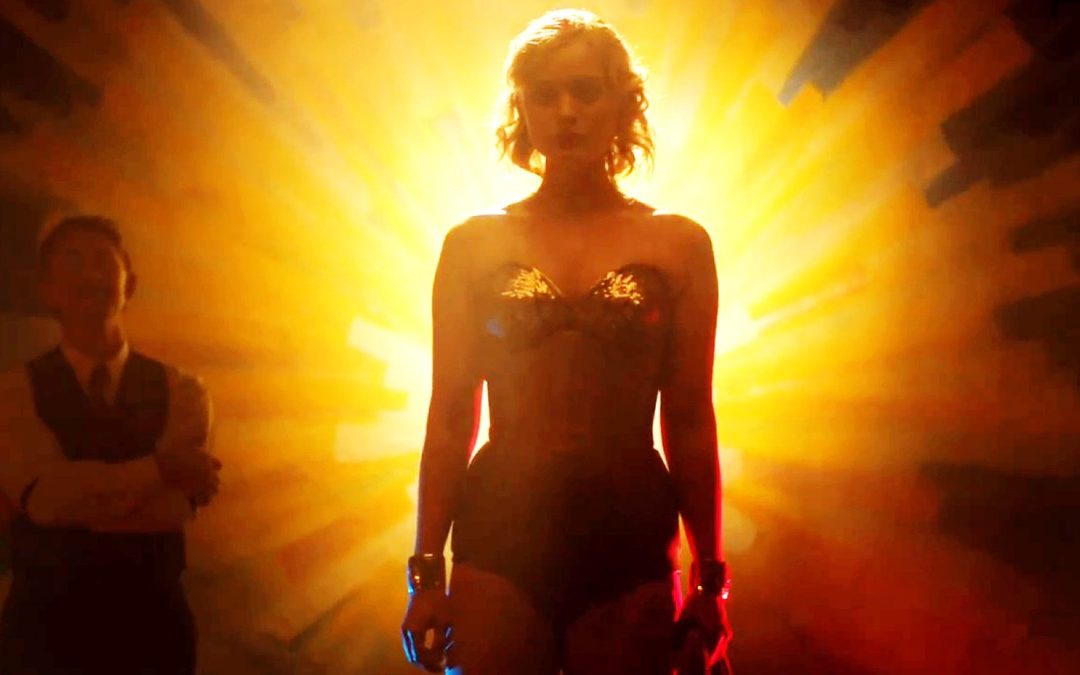Blink and you might miss it, but there’s a new movie that features not only a romantic triad, but a historical look at the importance of kink education.
Anyone in one or more circle of that Venn Diagram of queer, polyamorous, and kinky absolutely needs to Professor Marston and the Wonder Women.
Professor Marston and the Wonder Women tells the true story behind the creation of Wonder Woman— though the superheroine is really a footnote in the film. The focus is rather William Moulton Marston (the comics creator), his wife Elizabeth, and Olive Byrne, their lifelong romantic partner. The movie follows the relationship from the married couple meeting Byrne (she was their student and undergraduate assistant) through the ups and downs of their relationship, as the three struggle to maintain a queer, polyamarous relationship and still function within polite society.
At its heart, the film is a love story- beautifully told, with compelling, nuanced characters who love one another purely and fiercely in a world that’s certainly not ready for two women to publicly be in love, let alone a triad. For polyamorous folks who are still marginalized today, the act of going to the movies and seeing a resonant romance is powerful enough.
But remember that third circle of that Venn Diagram– as attentively as director Angela Robinson treats her subjects’ queerness (she herself is gay), and as kindly as she treats their polyamory, she’s also celebratory of the notion of kink in a loving relationship.
Fans of Wonder Woman as written by Marston have always picked up on the BDSM imagery strewn throughout the comic. It’s rather hard not to; only a few pages ever seem to go past without Wonder Woman or someone else tied up, or in chains, or being spanked, or mind-controlled. As an academic psychologist prior to his comic book career, Marston had a well-intentioned, if muddled take, on the intersections of feminism and psychosexuality. His clear interest in kink as part of woman’s liberation, and his own unusual home life, beg the admittedly invasive question- did he just write about kink, or did he incorporate it into his own life?
This movie says yes, and on top of everything else, there are some amazing, sexy scenes featuring BDSM. There’s an intense scene where the Marstons watch as Byrne paddles a pledge in her sorority, or the first time the trio has sex, when Byrne playfully ties down William’s wrists.
But overall, the trio doesn’t indulge much in kink, despite their latent desires. That is, until William wanders into a burlesque supply shop in Greenwich Village, in 1940. The proprietor, who also sells illegal pornography (including kinky stuff), is hosting an underground rope salon, and William convinces his partners to attend.
The salon is almost like a vintage TES class. The store proprietor ties up a partner in front a room of curious students, talking as he goes. He’s explaining not how to make the ties, but the appeal of playing with rope, why its a way of connecting with a lover. He invites our heroes to give it a try for themselves, and his investment in them playing with rope doesn’t seem prurient; he seems excited to spread his passion to others.
What ensues between Olive and Elizabeth is a simple, brief, but intensely erotic rope scene the likes of which you seldom, if ever, see in a film.
After that rope class, the triad embraces kink, and the next (wonderful) sex scene we see between the three of them is a joyful, erotic romp involving fetish-wear, power-play, and rope.
As far as these people were willing to transgress societal rules about sex and love, in this movie, they still need a boost of support when it comes to kink. Professor Marston and the Wonder Women respects the idea of privacy, but also encourages openness and living one’s own truth, especially one’s sexual desires. It plays out a bit like the TES creed, which argues for the “right to challenge established value systems,” and “the right to freely communicate and socialize with others of similar sexual orientation.”
Sitting right in the intersection of kinky, queer, and poly identities held by so many members, this film is a breath of fresh air. If TES had an official favorite movie, maybe it should be this one.

